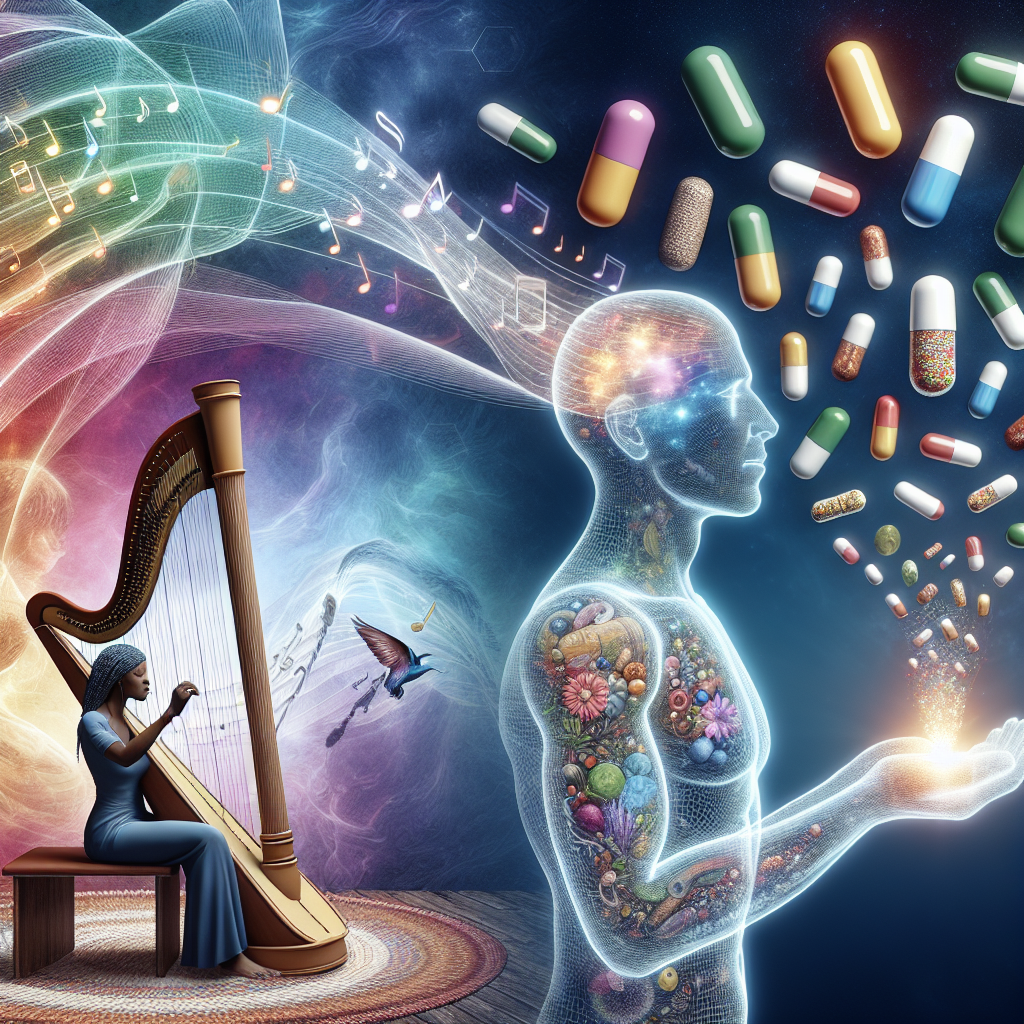How Music Therapy and Vitamins Work Together for Healing

Discover how music therapy and vitamins work together for healing. Uncover the power of this unique combination and how it can enhance your overall well-being. Visit My Vibrant Vitality to learn more.
The Synergistic Effects of Music Therapy and Vitamins on Healing
Music therapy and vitamins, two seemingly disparate elements, have been found to work in synergy to promote healing. This unique combination of sound and nutrition has been gaining traction in the medical community, with a growing body of research supporting its efficacy.
Music therapy, a form of expressive therapy, uses music to improve and maintain the physical, psychological, and social well-being of individuals. It involves a range of activities, from listening to music and playing a musical instrument, to singing and composing songs. The therapeutic benefits of music are well-documented. It has been shown to reduce stress, improve mood, and even alleviate pain.
On the other hand, vitamins are essential nutrients that our bodies need to function properly. They play a crucial role in maintaining health and preventing disease. Certain vitamins, such as vitamin C and E, are known for their healing properties. They aid in tissue repair and protect the body against the damaging effects of free radicals, thereby promoting healing and recovery.
When music therapy and vitamins are combined, they create a powerful healing synergy. The soothing effects of music help to reduce stress and anxiety, which are known to impede the healing process. By lowering stress levels, music therapy enhances the body’s ability to absorb and utilize vitamins more effectively. This, in turn, accelerates the healing process.
Moreover, music therapy stimulates the release of endorphins, the body’s natural painkillers. This effect is further enhanced by certain vitamins, such as vitamin B6 and B12, which have been found to boost endorphin levels. Together, they provide a natural and effective way to manage pain and promote healing.
The synergistic effects of music therapy and vitamins also extend to mental health. Music therapy has been shown to improve mood and reduce symptoms of depression and anxiety. Certain vitamins, such as B vitamins and vitamin D, are known to support mental health by regulating mood and relieving anxiety. When used together, they can provide a holistic approach to mental health care, addressing both the psychological and physiological aspects of mental health.
In addition, music therapy and vitamins can work together to enhance cognitive function. Music therapy has been found to improve memory and cognitive function, particularly in older adults and people with neurodegenerative diseases. Certain vitamins, such as vitamin B6, B12, and E, are known to support brain health and cognitive function. By combining music therapy and these vitamins, it may be possible to slow cognitive decline and improve quality of life for these individuals.
In conclusion, the combination of music therapy and vitamins offers a promising approach to healing. By addressing both the psychological and physiological aspects of health, this synergy can enhance the body’s natural healing processes, improve mental health, and support cognitive function. As research in this area continues to grow, it is hoped that this unique combination of sound and nutrition will become a standard part of holistic health care.
Exploring the Connection between Music Therapy and Vitamin Intake for Enhanced Recovery

Music therapy and vitamin intake may seem like two disparate elements, but they are increasingly being recognized for their combined potential in promoting healing and recovery. This article explores the intriguing connection between these two seemingly unrelated fields and how they can work together to enhance recovery.
Music therapy, a burgeoning field in healthcare, uses music interventions to address physical, emotional, cognitive, and social needs of individuals. It is a non-invasive and enjoyable method that has been found to reduce stress, alleviate pain, enhance memory, and improve communication. On the other hand, vitamins, essential nutrients that our bodies need for proper functioning, play a crucial role in maintaining health and aiding recovery. They boost the immune system, support growth and development, and help organs function properly.
The connection between music therapy and vitamin intake lies in their shared goal of promoting overall well-being and aiding recovery. Both music therapy and vitamins work to strengthen the body’s natural defenses and enhance its capacity to heal. They complement each other in a way that can significantly improve the recovery process.
Music therapy can stimulate the production of certain chemicals in the brain that promote healing and well-being. For instance, it can trigger the release of endorphins, the body’s natural painkillers, and serotonin, a mood stabilizer. This can help reduce pain and discomfort, improve mood, and promote a sense of calm and relaxation. These positive effects of music therapy can be further enhanced by proper vitamin intake. Vitamins, particularly B vitamins, are known to boost brain function and support the production of these chemicals. Therefore, combining music therapy with a balanced diet rich in essential vitamins can potentially enhance the therapeutic effects.
Moreover, music therapy can also help improve appetite and digestion, which are crucial for the absorption of vitamins. Stress and anxiety can often lead to poor appetite and digestion problems, which can hinder the body’s ability to absorb essential nutrients. By reducing stress and promoting relaxation, music therapy can help improve these conditions, thereby enhancing the body’s capacity to absorb and utilize vitamins.
Furthermore, certain vitamins, such as vitamin D, are known to enhance mood and promote mental well-being. Vitamin D deficiency has been linked to depression and mood disorders. Therefore, combining music therapy, which is known to improve mood, with vitamin D supplementation can provide a holistic approach to treating mood disorders and promoting mental health.
In conclusion, while music therapy and vitamin intake may seem like two distinct elements, they are interconnected in their shared goal of promoting health and aiding recovery. They complement each other in a way that can significantly enhance the healing process. Music therapy can stimulate the production of healing chemicals in the brain, which can be further boosted by proper vitamin intake. It can also improve conditions that are crucial for vitamin absorption. Meanwhile, certain vitamins can enhance the mood-improving effects of music therapy. Therefore, integrating music therapy and proper vitamin intake can provide a comprehensive approach to promoting health and enhancing recovery.
The Role of Music Therapy and Vitamins in Holistic Healing Approaches
Music therapy and vitamins, two seemingly disparate elements, have been found to work in harmony to promote healing and overall wellness. This unique combination is gaining traction in the realm of holistic healing, a field that emphasizes the treatment of the whole person, including physical, emotional, mental, and spiritual aspects.
Music therapy, a well-established health profession, uses music to address physical, emotional, cognitive, and social needs of individuals. It involves a range of activities, from listening to and creating music, to discussing lyrics and even moving to music. The therapeutic benefits of music are vast. It can reduce stress, alleviate pain, express feelings, enhance memory, and improve communication.
On the other hand, vitamins are organic compounds that our bodies need in small quantities for normal growth and metabolism. They play a crucial role in maintaining good health and wellbeing. Vitamins, particularly B-complex vitamins and vitamin D, have been linked to improved mood and reduced symptoms of depression and anxiety.
When music therapy and vitamins are combined, they can create a powerful healing synergy. Music therapy can stimulate the production of certain chemicals in the brain that promote healing and wellbeing. For instance, it can trigger the release of endorphins, the body’s natural painkillers, and dopamine, a neurotransmitter associated with pleasure and reward.
Meanwhile, vitamins can support this process by nourishing the brain and body, ensuring they function optimally. For example, B-complex vitamins are essential for the production of neurotransmitters like serotonin, which regulates mood, sleep, and appetite. Vitamin D, often referred to as the ‘sunshine vitamin’, can also boost mood and energy levels, further enhancing the positive effects of music therapy.
Moreover, music therapy can help to reduce the stress and anxiety that often accompany illness or injury. This relaxation can enhance the body’s ability to absorb and utilize vitamins, making them more effective. In turn, the improved nutritional status can boost the immune system, speed up recovery, and enhance the body’s resilience against future health challenges.
The combination of music therapy and vitamins also aligns with the holistic healing approach’s emphasis on individualized care. Music therapy can be tailored to the individual’s musical preferences and therapeutic needs, making it a highly personalized form of treatment. Similarly, vitamin supplementation can be customized based on the individual’s nutritional needs and health status.
In conclusion, the integration of music therapy and vitamins in holistic healing approaches offers a promising avenue for promoting health and wellbeing. This combination harnesses the power of music to heal the mind and body, while vitamins provide the necessary nutritional support to enhance this process. As research continues to uncover the intricate links between music, nutrition, and health, it is hoped that more people will benefit from this harmonious blend of therapies.
While this approach may not replace conventional medical treatments, it can certainly complement them, offering a more comprehensive and holistic approach to health care. After all, healing is not just about curing illness, but also about nurturing the whole person, and music therapy combined with vitamins can play a significant role in this process.